Greetings from planet earth план урока
Обновлено: 30.06.2024
Цель урока – выработка умений самостоятельно применять полученные знания в речевой ситуации.
- Образовательные: оперировать имеющимся потенциалом в конкретной ситуации, закрепить умения и навыки работы с новыми понятиями, явлениями, научить отстаивать свою точку зрения
- Воспитательные: формировать экологическую культуру обучающихся, любовь и бережное отношение к природе.
- Развивающие: развивать логическое мышление, способность к анализу, умение выступать и защищать свою точку зрения, развивать коммуникатиные навыки работы в группах, творческие способности.
Оснащение – учебник “Spotlight 8”, видеопроектор, презентация, видеофильм, плакат “How big is the problem”, плакат “Message to humanity”, раздаточный материал
Тип урока – комбинированный.
А) Приветствие, речевая разминка, мозговой штурм.
Teacher: Good morning dear children! I am extremely glad to see you here with me, and hope to spend great time all together. Happy to find you smiling and optimistic, by the way, can you name at least
a) 5 reason which make you smile?
b) 5 reasons to feel happy?
c) 5 goals you want to reach in your life?
d) 5 things that irritate you?
(answers of students)
B) Мотивация на работу по теме урока
Teacher – My dear students, yesterday I received an invitation from my British colleagues to participate in the scientific congress in London next month. I must be prepared for it, but they seem to forget to inform me about the theme of the congress. They have just sent me a video, perhaps, watching it we will be able to realise what the topic is. So let’s do it now together!
- Travelling around our wonderful world
- Global problems of the Earth
- Medicine issues
- Environmental protection
- The future of the Earth is in our hands
(Students choose the right variant and stick it in the middle of the blackboard.)
Teacher – What feeling do you have after watching the video? ( sympathy, anger, sadness, horror, sorrow). Do you really believe our planet is in danger now? Do you expect a lot of fun from our lesson?
Now I hope you will help me prepare for the congress, won’t you?
2. Основная часть урока.
А) Введение новой лексики.
Teacher - Let us learn some new vocabulary to be able to have our conversation: Включается презентация. Слайд 1. Оглавление “Save our planet”
Слайд 2, 3 – введение новой лексики к теме урока.
To donate (to) – жетвовать, дарить
To heal (of) – исцелять от.
To get rid (of )– избавляться от.
To save - экономить, спасать
To ban - запрещать
To fine for - штрафовать
Compassion - жалость, сострадание, сочувствие
To destruct, to destroy – разрушать
B) Практикование новых слов в устной речи.
Match the word from the left column to those from the right one. (Работа на раздаточных карточках – приложение 1)
| 1 To get rid of | a) pollution |
| 2 To ban | b) animals |
| 3 To fine for | c) littering |
| 4 To reduce | d) hunting |
| 5 To donate to | e) violence |
| 6 To destroy | f) our souls |
| 7 To save | g) natural habitat |
| 8. To heal | h) water |
Keys: 1e, 2d, 3c, 4a, 5b, 6g, 7h, 8f.
Teacher - Great job, and now let’s refresh the vocabulary on this topic.
С) Закрепление лексики, актуализация знаний.
Слайд 4. Teacher: I want to suggest you the saying of Mahatma Gandhi as an epigraph for our lesson “Be the change you wish to see in the world”. Tell me, how can you explain these words?
(Предполагаемый ответ обучающихся – I think it means that in order to change the world we must change our souls, our minds.)
So let’s revise what global issues we are going to discuss today.
Слайд 5. Three categories of global issues – natural disasters, ecological problems and social problems.

Учитель показывает слайды с 6 по 15, с 19 по 24, ученики определяют по изображению название глобальной пробемы.
Слайды 16 – 18; 25 - 29 - просмотр, чтение и комментирование.
- In my opinion;
- To my mind;
- I think ;
- I believe;
express your opinion and say what the most serious and dangerous problem for the Earth is. But first please write down your variant on the piece of paper and stick it on the blackboard.
Используя интерактиный прием “Карусель”, ученики выражают свое мнение.
Один из учеников подсчитывает результат, а в это время проводится релакс-минутка.
- So, as we can see, the most serious problem for our planet, in your opinion, is.
- The next place is going to.
- The third place is going to.
(Ученики объявляют результаты опроса и согласно им заполняют плакат “How big is the problem ?” (Приложение 2) и приклеивают соответствующие стикеры-смайлики)
Teacher – As we can see, many problems are caused by human activities. We are not magicians, we are not scientists, we are not a government. But we can heal the world, changing our mind, changing ourselves. What can we do, each of us, to protect our nature, to save our planet?
Teacher – You are right, children, first of all we should be GREEN; who remembers what it means to be green?
So, what else can we do for saving our planet?
(Ответы обучающихся - Turn off water while brushing our teeth, switch off the light when leave a room, reuse old crayons and bottles, paint coffee cans and use them for plants, donate old clothes and toys to charity, make birdfeeders, plant own vegetables, and recycle plastic bottles and bags, aluminium cans, electronics, glass, paper.)
Now, when we realise that we are really able to do much to help the environment, tell me, how green you are.
(Учащиеся высказываются, используя словесную опору (слайд 28)
Teacher – So, being green is very important, but let‘s recall the epigraph of our lesson “be the change you want to see in the world”. You told me that we should change ourselves. What exactly should we change in our souls?
(Предполагаемые ответы обучающихся – We must get rid of greed and violence, we must have mercy and compassion in our souls. We must be generous, kind and friendly.)
Teacher – I believe that you will do your best to follow these rules. And now let us make the message to humanity, to the next generations, expressing our claims, our thoughts on these colourful pieces of paper.
Учащиеся выполняют проектную работу “Послание человечеству” . На лист ватмана дети приклеивают заготовленные заранее картинки по теме “Экология, глобальные проблемы человечества” и на листочках бумаги в форме детской ладошки пишут призывы к будущему поколению, затем приклеивают их на плакат. Работа ведется всей группой.
3. Окончание урока.
Teacher - My dear students, thank you for your priceless help, now I feel prepared for the conference, and the last task for you. Express your impressions about our work at the lesson in the cinquain. Let it be about our planet.
The Earth
Magnificent, unique,
Feeding, protecting, caring,
It needs our love and help.
Planet.
Teacher - And now let us sing the wonderful song by Michael Jackson which was created to help the people in Africa.
B) Исполнение песни “We are the world”
There comes a time when we hear a certain call
When the world must come together as one
There are people dying
And it’s time to lend a hand to life
The greatest gift of all
We can't go on pretending day by day
That someone, somewhere will soon make a change
We are all a part of God's great big family
And the truth, you know,
Love is all we need
[Chorus]
We are the world, we are the children
We are the ones who make a brighter day
So let’s start giving
There's a choice we're making
We're saving our own lives
It’s true we'll make a brighter day
Just you and me.
Teacher – Our lesson is over, thank you for your job, your home task is to make up 14 sentences, using new words. Good bye!
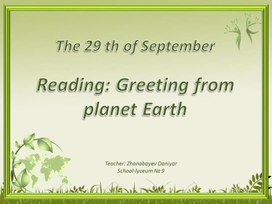
Vocabular mission (n) - миссия represent (v) - ұсыну solar system (n) – күн жүйесі space exploration (n) – ғарышты игеру spacecraft (n) – ғарыш…
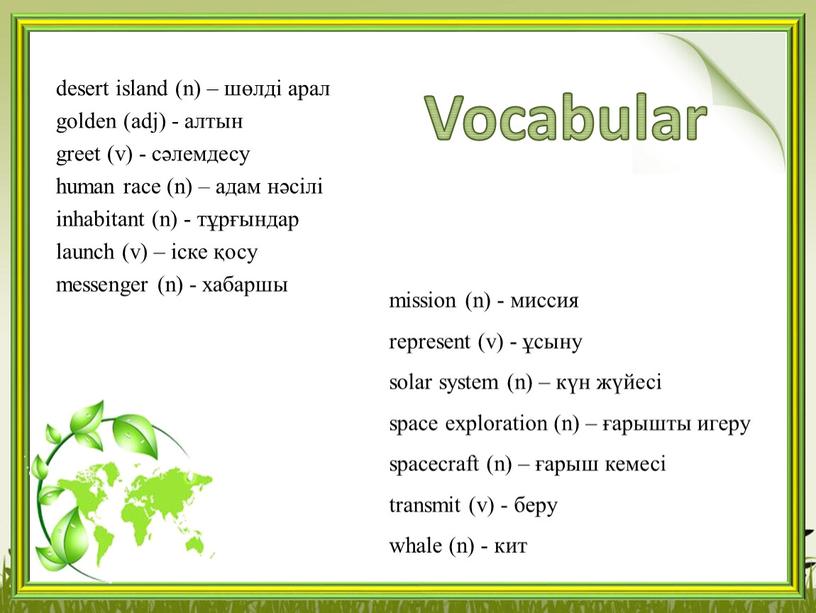
desert island (n) – шөлді арал
golden (adj) - алтын
greet (v) - сәлемдесу
human race (n) – адам нәсілі
inhabitant (n) - тұрғындар
launch (v) – іске қосу
messenger (n) - хабаршы
mission (n) - миссия
represent (v) - ұсыну
solar system (n) – күн жүйесі
space exploration (n) – ғарышты игеру
spacecraft (n) – ғарыш кемесі
transmit (v) - беру
whale (n) - кит
Greeting from planet our Earth
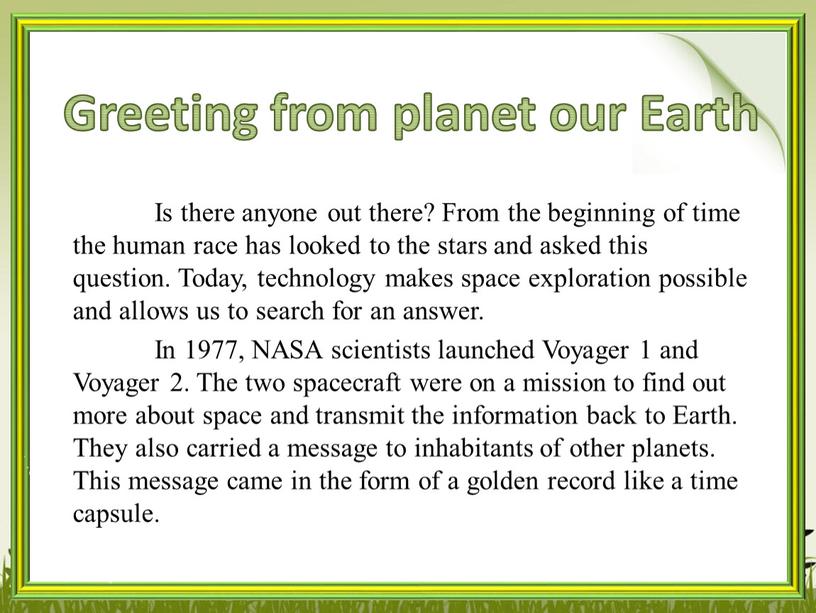
Greeting from planet our Earth
Is there anyone out there? From the beginning of time the human race has looked to the stars and asked this question. Today, technology makes space exploration possible and allows us to search for an answer.
In 1977, NASA scientists launched Voyager 1 and Voyager 2. The two spacecraft were on a mission to find out more about space and transmit the information back to Earth. They also carried a message to inhabitants of other planets. This message came in the form of a golden record like a time capsule.
Greeting from planet our Earth (Continue)
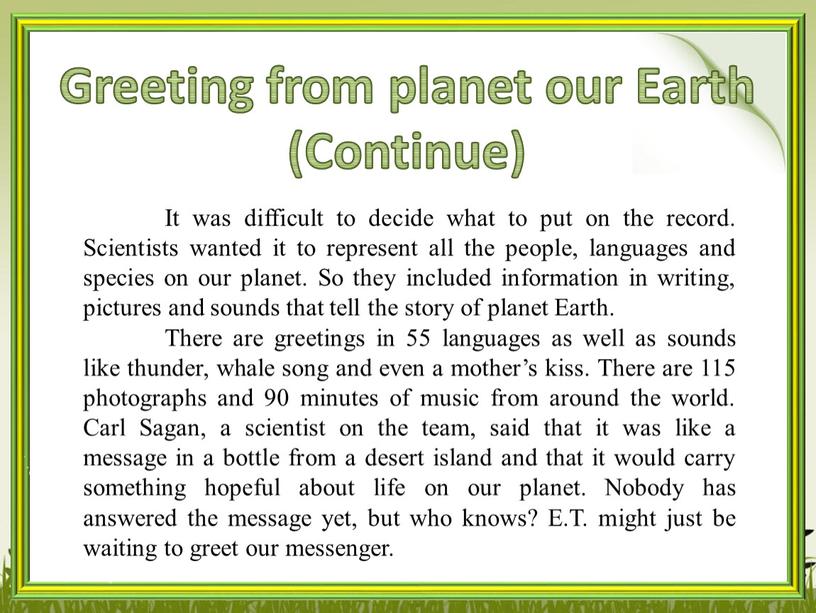
Greeting from planet our Earth
(Continue)
It was difficult to decide what to put on the record. Scientists wanted it to represent all the people, languages and species on our planet. So they included information in writing, pictures and sounds that tell the story of planet Earth.
There are greetings in 55 languages as well as sounds like thunder, whale song and even a mother’s kiss. There are 115 photographs and 90 minutes of music from around the world. Carl Sagan, a scientist on the team, said that it was like a message in a bottle from a desert island and that it would carry something hopeful about life on our planet. Nobody has answered the message yet, but who knows? E.T. might just be waiting to greet our messenger.
How many spacecraft did the NASA scientists launch into space in 1977?
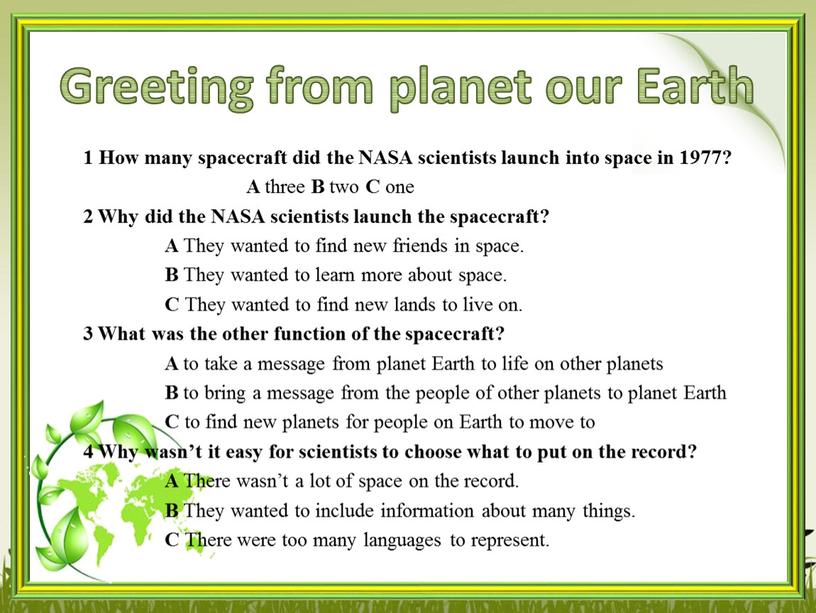
1 How many spacecraft did the NASA scientists launch into space in 1977?
A three B two C one
2 Why did the NASA scientists launch the spacecraft?
A They wanted to find new friends in space.
B They wanted to learn more about space.
C They wanted to find new lands to live on.
3 What was the other function of the spacecraft?
A to take a message from planet Earth to life on other planets
B to bring a message from the people of other planets to planet Earth
C to find new planets for people on Earth to move to
4 Why wasn’t it easy for scientists to choose what to put on the record?
A There wasn’t a lot of space on the record.
B They wanted to include information about many things.
C There were too many languages to represent.
Свидетельство и скидка на обучение каждому участнику
Зарегистрироваться 15–17 марта 2022 г.
Short plan № 23
Long-term plan: Unit 2 “Communication and Technology”
Gymnasium № 41
Date: 30.09-04.10
Teacher’s name: Chirkova L.A.
Theme of the lesson: Greetings from planet Earth
Learning objectives(s) that this lesson is contributing to
7.S7 use appropriate subject-specific vocabulary and syntax to talk about a range of general topics, and some curricular topics
7.L6 deduce meaning from context with little support in extended talk on a limited range of general and curricular topics
7.R2 understand specific information and detail in texts on a range of familiar general and curricular topics
Lesson objectives
To read for gist, to use active vocabulary
Success criteria
Write down translation of active vocabulary
Choose the correct answer
Fill in gaps using active vocabulary
Value links
Respect, Support, Trust, academic honesty
Cross curricular links
Learners use dictionaries if necessary, no ICT skills are focused on this lesson
Previous learning
Learners know words related to the topic
Planned timings
Planned activities (replace the notes below with your planned activities)
1.Warm up (W, D) Pre-reading activity
Students write translation.
desert island (n)
space exploration (n)
человечество, род человеческий
космические исследовани я;
Success criteria
2. Activity 1. (W, I) SB: Ex. 1, p.18 Reading
Read the title and the first sentence in each paragraph in the text. What is the text about? Listen and read to find out.
Is there anyone out there? From the beginning of time the human race has looked to the stars and asked this question. Today, technology makes space exploration possible and allows us to search for an answer. In 1977, NASA scientists launched Voyager 1 and Voyager 2. The two spacecraft were on a mission to find out more about space and transmit the information back to Earth. They also carried a message to inhabitants of other planets. This message came in the form of a golden record like a time capsule.
It was difficult to decide what to put on the record. Scientists wanted it to represent all the people, languages and species on our planet. So they included information in writing, pictures and sounds that tell the story of planet Earth. There are greetings in 55 languages as well as sounds like thunder, whale song and even a mother’s kiss. There are 115 photographs and 90 minutes of music from around the world. Carl Sagan, a scientist on the team, said that it was like a message in a bottle from a desert island and that it would carry something hopeful about life on our planet. Nobody has answered the message yet, but who knows? E.T. might just be waiting to greet our messenger.
3. Activity 2 ( P, f) Post-reading activity SB: Ex. 2, p.18
Students read the text and, for questions 1-4, choose the correct answer (A, B or C).
1 How many spacecraft did the NASA scientists launch into space in 1977?
A three B two C one
2 Why did the NASA scientists launch the spacecraft?
A They wanted to find new friends in space.
B They wanted to learn more about space.
C They wanted to find new lands to live on.
3 What was the other function of the spacecraft?
A to take a message from planet Earth to life on other planets
B to bring a message from the people of other planets to planet Earth
C to find new planets for people on Earth to move to
4 Why wasn’t it easy for scientists to choose what to put on the record?
A There wasn’t a lot of space on the record.
B They wanted to include information about many things.
C There were too many languages to represent.
1 Space . will benefit everyone on our planet.
2 Our school buried a time . and hopefully someone in the future will find

7.C6 Organise and present information clearly to others.
7.S1 Use formal and informal registers in their talk on a limited range of general and curricular topics.
Lesson objectives
All learners will be able to:
name all the planets;
Most learners will be able to:
express their ideas;
Some learners will be able to:
answer high order question;
Language objective
learn new vocabulary on the topic
Value links
Cross curricular links
Previous learning
Vocabulary on the topic Space
Use of ICT
Projector or Smart board to show a video
Intercultural awareness
Students will understand that the Earth is home for a huge number of people who are living on it.
Kazakh culture
Pastoral Care
Students will understand that the Earth is the common living place for diverse people who are responsible for it.
Health and Safety
Everyday classroom instructions will ensure that safety measures are provided to prevent from the accidents in a classroom. The classroom is aired before the lesson.
Planned timings
Planned activities
1. Leading-in stage (W)
Teacher greets students and discusses the safety rules in the classroom.
Teacher asks students to name the planets they remembered from the first lesson of this topic (whole group work).
Teacher elicits the answers on the board
Teacher practises the pronunciation of the planets’ names helping students to remember correct pronunciation with the help of video.
2. Teacher tells the students the objectives of the lesson
know new words on the topic
know information about the Earth
3. The main part of the lesson
Teacher asks students to draw the Solar system.
Students share their images with their classmates walking around the room.
Students fix their images on the board
Differentiation
Teacher assists those students who need the help
Students share their answers with their peers (pair work).
Teacher presents students the Solar system image with answers.
Students assess their knowledge of Solar system by comparing their answers with the provided answers (Self-assessment).
Teacher highlights our planet in the picture of the Solar system by asking the question “How is the Earth different from other planets” (What is there on the Earth that the other planets do not have?). Expected answer: Life………
Teacher asks students to check their knowledge by filling the passport of the Earth. Students can choose any points in the passport to fill.
Students discuss their answers in small groups/or pairs and add some information after their discussion.
Differentiation
The number of completing the tasks vary from 3-9. Students can choose any points and number to write about. Teacher gives more help to certain pupils within pairs and/or groups.
Teacher presents the passport that students can read and compare their answers with their own. Students can use dictionaries to find unfamiliar words. Students highlight the information about the Earth in the passport:
Развивающая цель: развитие и совершенствование навыков обучающихся во всех видах речевой деятельности, самостоятельности, исследовательских и проектных навыков.
Воспитательная цель: воспитать интерес к английскому языку как к средству общения.
Метапредметные: формирование навыков организации целеполагания, планирования, анализа, рефлексии учебной деятельности; формирование навыков самооценки и взаимооценки; формирование мотивации к изучению английского языка; формирование навыков работать с компьютерной техникой.
Личностные: формирование навыков самостоятельного поиска, анализа, отбора и сохранения необходимой информации; формирование навыков взаимодействия с окружающими при работе в группе, владения различными социальными ролями в коллективе; развитие воображения при моделировании ситуации общения; формирование психологической грамотности, культуры мышления и поведения.
Технологии, применяемые на уроке:
Когнитивная: дискуссия, проектная деятельность;
Мультимедийные: аудио-, видео, компьютерные программы;
Сотрудничества: совместное составление мини – диалогов, разработка проектов;
Зздоровьесберегающие: релаксационная пауза, смена видов деятельности.
ТСО: компьютер, мультимедийный проектор, интерактивная доска
Дидактический материал: упражнение на сопоставление для закрепления и актуализации, изученных лексических единиц и словосочетаний.
Раздаточный материал: листы с заданиями для закрепления лексического материала, текст по аудированию, схемы составления мини проекта для рефлексии.
Pupils. Platoon, Fall in, Dress right, Attention. Madam the platoon is ready for the lesson. All cadets are present. Cadet Didur Mark has reported.
Teacher. Good afternoon, children! Good afternoon, dear guests! Nice to meet you. Let’s start our lesson.
- Постановка цели и задач урока. Мотивация учебной деятельности учащихся. Речевая разминка (4 min).
T: Today we’ll have an unusual lesson and very interesting topic for speaking. Alyona and Stepan help us to know the theme of our lesson. Please, come to the blackboard and show us your homework.
P: The dialogue about the plans.
T: Thanks. Pupils, can you guess the theme of our lesson?
P2: In my opinion…
T: Right you are.
Listen, repeat and read:
The Earth is a garden.
It’s a beautiful place
For all living creatures,
For all the human race.
Helping Mother Earth
We can peacefully roam
We all deserve a place
We can call our home.
T: Girls and boys look at the blackboard and let’s learn information about our homeland and make notes (presentation). The Earth is the only planet where there is life.
T: Do you know the day of Earth?
P: It is the 22nd of April.
T: Excellent. At first, we’ll introduce with new words. Listen to me, repeat after me, and learn by heart.
T: Now I’ll give you 3 minutes, please make the sentences with new words.
Nature, environment, reduce, reuse, recycle, not to hurt, not to damage, not to cut down, the pollution, wastes, litter.
T: Let’s work in pairs and check how you learn new words. You’ll take the tasks where you must fill in the gaps with words derived from the words in brackets.
Nature, environment, to reduce, to reuse, to recycle, not to hurt, not to damage, not to cut down, the pollution, wastes, to litter.
- ___________ is under threat.
- So we all need to work together to safeguard our ______________.
- The Government is very worried about the ___________ of our rivers and beaches.
- Many household ____________ like bottles and newspapers can be recycled and used again.
- Don’t ______________ birds’ nests and _______________ trees.
- Don’t leave ___________ after your picnics and ____________ animals.
- Remember these three rules: __________________________ .
T: Are you ready? Please, look at the blackboard and check your works. Put the marks for yourselves and tell us.
Let’s have a rest. Please, stand up, sing a song and repeat the moves.
Chorus: Mother Earth, Mother Earth
It's a great place to be
Mother Earth, Mother Earth
Home planet for you and me
Look after our earth with care
'Cos it's a planet we all share
Humans, animals, plants and trees
Let's live together in harmony
In ourselves, we must take pride
For our future, we need to strive
Be kind it's worthwhile
Light the world up with your smile!
T: We’re going to watch the film and after it you’ll do some exercises. At first find the papers on your tables. You should fill in the gaps after watching it. The gaps are the names of the parts.
- Air pollution
- Water pollution
- Acid rains
- Nuclear pollution
- The Greenhouse effect
Environmental problems is the most burning problem of today.
The ecological problem influence the climate on the Earth. Humankind long believed that, whatever we did, the Earth would remind much the same. Nature is under threat. Our country’s pollution can be every country’s problem. So we all need to work together to safeguard our environment.
Air pollution is a very serious problem. Industrial enterprises emit tons of harmful substances. They are the main reason for the greenhouse effect and acid rains. The pollution of air and the world’s ocean, destruction of the ozone layer is the result of man’s careless interaction- with nature a sign of the ecological crises.
Rains, full of acid chemicals, change lakes, rivers, as well as forests. Acid water kills the plants and animals that usually live in water. Acid rain makes the Earth more acidic and some kinds of trees cannot live in the soil that is very acidic. Forests are disappearing and this upsets the oxygen balance.
Water pollution occurs mostly, when people overload the water environment such as streams, lakes, underground water, bays or seas with wastes or substances harmful to living being.
Nuclear weapons is also course of the pollution. It brings a great damage to the agriculture, forests and people’s health.
The greenhouse effect and global warming both correspond with each other. The greenhouse effect is recalled as incoming solar radiation that passes through the Earth’s atmosphere but prevents much of the outgoing infrared radiation from escaping into outer space. It causes the overheat of the air as a result we have the global warming effect.
People are beginning to realize that environmental problems are not somebody else’s. In many countries, environmental protection agencies and research centers are up. Such organization as “Green Peace” cares for ecology in countries. Its main goal is to combine the people’s efforts for peace with the huge and ever-mounting movement launches all environmental actions and inform of the ways, means and results of this work.
T: Fill in the table. You’ve got 2 minutes.
T: Let’s check, What’s the first ecological problem? (2 nd , 3 rd , 4th, 5th)
T: Find next task on your papers. Your task say True, False or Not Stated.
- Nature is under threat.
- We all needn’t to work together to safeguard our environment.
- “Green Peace” cares for ecology in countries.
- In many countries, environmental protection agencies and research centers aren’t up.
- More and more often people are told not to spend too much time in direct sunlight, because ultraviolet radiation from the sun can cause skin cancer.
T: Changes your papers and check them.
T: We’ve learned a lot of information, and let’s check our knowledge. Make two groups. I will give out the task, and you make some mini project.
- Объяснение домашнего задания и выставление оценок (3 min).
Your homework will be make your own list of rules: What can we reduce, reuse and recycle?
Your marks! Thanks your working. Our lesson is over. Good-bye.
По теме: методические разработки, презентации и конспекты

Цель: 1. Проверка знаний учащихся по теме; 2. Умение решать квадратные уравнения с параметром; 3. Правильная запись решений.

Открытый урок 8 класс. Тема урока: “Global ecological problems”
Задачей современной школы является обеспечение условий для формирования у обучаемых адекватной современному уровню знаний картины мира и интеграции личности ученика в систему мировой и националь.

Тема: Предлог. (Закрепление знаний)Цель урока а) учебная: систематизировать и обогатить знания учащихся о предлоге, на основе заданий-исследований предупредить возможные ошибки в употреблении предлого.

Проект открытого урока 9 класса "Открытие нейтрона. Состав атомного ядра. Массовое число. Изотопы"
Развитие грамматических навыков употребления времени Present Perfect Tense в различных видах речевой деятельности.
Открытый урок 6 класс. Тема урока: "Черты характера человека".
Сформировать у учащихся знание основной лексики , включающей синонимы и антонимы , основные префиксы,придающие словам отрицательное значение.

Открытый урок 10 класс Тема урока Волейбол
Тема урока: Спортивные игры "Волейбол"Цель урока: Укрепление здоровья и подготовка учащихся к внутришкольным соревнованиям по волейболу.Задачи урока.* Совершенствовать техн.
Читайте также:

